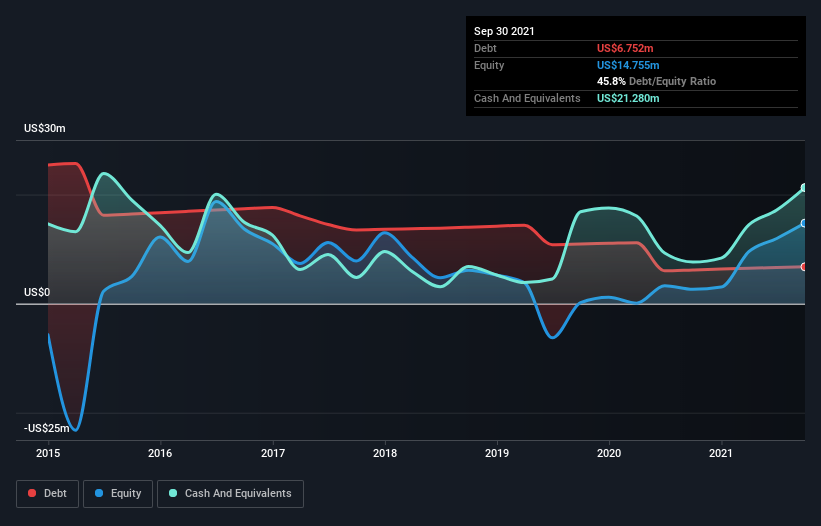Is Plus Therapeutics (NASDAQ:PSTV) A Risky Investment?
Warren Buffett famously said, 'Volatility is far from synonymous with risk.' So it seems the smart money knows that debt - which is usually involved in bankruptcies - is a very important factor, when you assess how risky a company is. We can see that Plus Therapeutics, Inc. (NASDAQ:PSTV) does use debt in its business. But is this debt a concern to shareholders?
Why Does Debt Bring Risk?
Debt and other liabilities become risky for a business when it cannot easily fulfill those obligations, either with free cash flow or by raising capital at an attractive price. In the worst case scenario, a company can go bankrupt if it cannot pay its creditors. However, a more usual (but still expensive) situation is where a company must dilute shareholders at a cheap share price simply to get debt under control. Of course, plenty of companies use debt to fund growth, without any negative consequences. The first thing to do when considering how much debt a business uses is to look at its cash and debt together.
Check out our latest analysis for Plus Therapeutics
How Much Debt Does Plus Therapeutics Carry?
As you can see below, at the end of September 2021, Plus Therapeutics had US$6.75m of debt, up from US$6.18m a year ago. Click the image for more detail. However, it does have US$21.3m in cash offsetting this, leading to net cash of US$14.5m.
A Look At Plus Therapeutics' Liabilities
We can see from the most recent balance sheet that Plus Therapeutics had liabilities of US$9.49m falling due within a year, and liabilities of US$507.0k due beyond that. Offsetting this, it had US$21.3m in cash and US$951.0k in receivables that were due within 12 months. So it can boast US$12.2m more liquid assets than total liabilities.
This luscious liquidity implies that Plus Therapeutics' balance sheet is sturdy like a giant sequoia tree. With this in mind one could posit that its balance sheet means the company is able to handle some adversity. Succinctly put, Plus Therapeutics boasts net cash, so it's fair to say it does not have a heavy debt load! There's no doubt that we learn most about debt from the balance sheet. But it is future earnings, more than anything, that will determine Plus Therapeutics's ability to maintain a healthy balance sheet going forward. So if you're focused on the future you can check out this free report showing analyst profit forecasts.
Given its lack of meaningful operating revenue, Plus Therapeutics shareholders no doubt hope it can fund itself until it has a profitable product.
So How Risky Is Plus Therapeutics?
By their very nature companies that are losing money are more risky than those with a long history of profitability. And in the last year Plus Therapeutics had an earnings before interest and tax (EBIT) loss, truth be told. Indeed, in that time it burnt through US$11m of cash and made a loss of US$13m. But the saving grace is the US$14.5m on the balance sheet. That means it could keep spending at its current rate for more than two years. Even though its balance sheet seems sufficiently liquid, debt always makes us a little nervous if a company doesn't produce free cash flow regularly. When analysing debt levels, the balance sheet is the obvious place to start. However, not all investment risk resides within the balance sheet - far from it. To that end, you should learn about the 6 warning signs we've spotted with Plus Therapeutics (including 3 which shouldn't be ignored) .
At the end of the day, it's often better to focus on companies that are free from net debt. You can access our special list of such companies (all with a track record of profit growth). It's free.
This article by Simply Wall St is general in nature. We provide commentary based on historical data and analyst forecasts only using an unbiased methodology and our articles are not intended to be financial advice. It does not constitute a recommendation to buy or sell any stock, and does not take account of your objectives, or your financial situation. We aim to bring you long-term focused analysis driven by fundamental data. Note that our analysis may not factor in the latest price-sensitive company announcements or qualitative material. Simply Wall St has no position in any stocks mentioned.
Have feedback on this article? Concerned about the content? Get in touch with us directly. Alternatively, email editorial-team (at) simplywallst.com.

